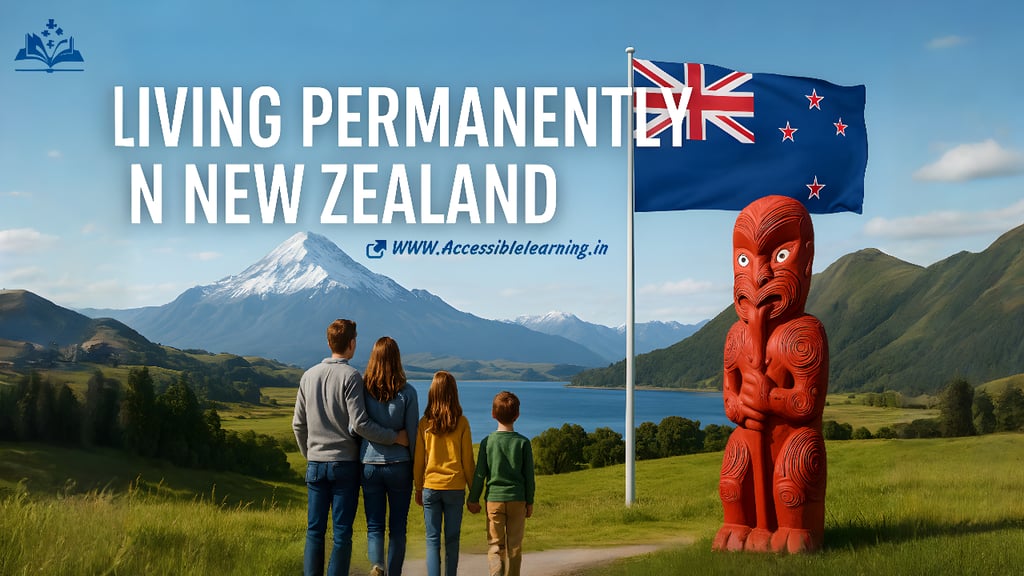
Living Permanently in New Zealand: A 12-Year Journey Through Kiwi Life, Culture, and Growth
Discover what it’s like living permanently in New Zealand for over 12 years—explore Kiwi culture, lifestyle, government, economy, and the essence of daily life in this peaceful, nature-rich nation.
AWARE/VIGILANTNEPOTISM/SOCIAL ISSUESNEW ZEALANDTRAVEL LIFE
Kim Shin
10/9/20255 min read


Living permanently in New Zealand is more than just settling in a beautiful island nation—it’s about embracing a balanced lifestyle that blends nature, culture, and community spirit. Known for its breathtaking landscapes, clean cities, and friendly people, New Zealand offers a quality of life that few countries can match.
After living in New Zealand for 12 years, one begins to understand not just its scenic beauty but also the heart of its people, the fairness of its governance, and the calm rhythm of its daily life. This article takes you through that very experience—what it truly feels like to call New Zealand home forever.
The Essence of Kiwi Life
Life in New Zealand revolves around simplicity, respect, and balance. The Kiwis (as New Zealanders are affectionately known) have a relaxed approach to living—valuing work-life harmony, time in nature, and family gatherings.
You’ll often find locals spending weekends hiking through native forests, enjoying barbeques on beaches, or simply having a cup of coffee in small, charming cafés. Despite technological advancements and modern infrastructure, New Zealanders remain deeply connected to their roots and environment.
The Maori culture, which forms an essential part of the national identity, adds richness and depth to the Kiwi lifestyle. Words like “Kia Ora” (hello) or “Whānau” (family) are woven into everyday language, reflecting the respect for indigenous heritage.
The Government and Living Standards
New Zealand is a stable democracy known for its transparency, fairness, and minimal corruption. The government focuses on social welfare, equal opportunities, and sustainability—making it one of the most livable countries in the world.
Citizens enjoy benefits such as free public healthcare, subsidized education, and a clean, green environment. The New Zealand government actively encourages permanent residents to contribute to the community through entrepreneurship, innovation, and cultural participation.
The legal system is strict but fair. Laws related to immigration, work, and the environment are respected and well-regulated. For instance, Kiwis are highly conscious about climate policies—waste segregation, renewable energy, and wildlife conservation are part of daily responsibility, not just slogans.
Working and Growing in New Zealand
New Zealand’s economy thrives on industries like agriculture, tourism, IT, film production, and renewable energy. Over the past decade, cities like Auckland, Wellington, and Christchurch have transformed into creative and tech-driven hubs.
The work culture here is known for its openness, equality, and respect for time. Unlike many fast-paced countries, employers in New Zealand emphasize mental health and personal life balance. The average full-time employee works around 37–40 hours a week, and flexible working conditions are quite common.
If you’re skilled, New Zealand’s Skilled Migrant Category and Permanent Residency (PR) pathways make it relatively easier to build a long-term career here. Once you become a permanent resident, you enjoy almost all the same rights as a citizen—including healthcare, education, and legal protection.
The Kiwi Community and Culture
New Zealand’s community life is one of the friendliest in the world. Locals are polite, honest, and value inclusivity. Neighbors often know each other by name, and volunteering or helping others is part of the cultural norm.
Cultural diversity has grown significantly—people from India, China, South Africa, the UK, and the Pacific Islands have found their second home here. Yet, despite this diversity, Kiwis have managed to maintain a strong national identity rooted in unity and fairness.
Festivals like Waitangi Day, Matariki (Māori New Year), and Christmas in summer reflect a society that celebrates tradition with openness. Whether it’s joining a rugby match or a local food market, everyone participates with genuine enthusiasm.
Lifestyle and Cost of Living
The cost of living in New Zealand depends on the region—cities like Auckland and Wellington are more expensive, while smaller towns like Dunedin or Nelson are more affordable.
However, the standard of living is exceptional. Clean air, low pollution, stunning landscapes, and access to quality healthcare and education make every penny worth it.
Owning a house can be challenging due to rising property prices, but the government supports first-time home buyers and sustainable housing developments. Public transport is improving, and roads are among the safest globally.
Daily life feels peaceful—people respect privacy, maintain cleanliness, and cherish the natural surroundings. It’s not uncommon for offices to close early on Fridays, letting employees enjoy family time or head out for weekend adventures.
The Beauty of Nature and Outdoor Living
New Zealand’s natural beauty is its most profound gift. Living here for 12 years means you witness the stunning contrast of snow-capped mountains, volcanic plateaus, rainforests, beaches, and rolling green hills—all within a few hours’ drive.
Outdoor activities like hiking, skiing, kayaking, and camping are a lifestyle, not just hobbies. National parks like Fiordland, Tongariro, and Abel Tasman are world-famous for their trails and wildlife.
This connection with nature shapes New Zealand’s culture—teaching people humility, respect for the earth, and the value of simple joys.

Education, Family, and Safety
For families, New Zealand offers one of the safest and most supportive environments. Education is world-class, with a focus on creativity, independence, and practical learning.
Children grow up surrounded by nature, community values, and multicultural exposure—making them confident and empathetic individuals.
Safety is another key feature—crime rates are low, and communities work together to maintain peace. Even in cities, you can walk freely at night without much worry.
Challenges of Living Permanently in New Zealand
While the quality of life is excellent, it’s not without challenges. The cost of housing and distance from other countries can feel isolating for newcomers. Imported goods are often expensive, and weather conditions can vary greatly from one island to another.
However, most expats and long-term residents agree that these are small trade-offs for a life filled with peace, balance, and genuine human connection.
After 12 years, living in New Zealand transforms you. You learn to slow down, appreciate community over competition, and live in harmony with nature.
The country teaches you that success isn’t about wealth—it’s about happiness, freedom, and respect for every living thing.
If you’re planning to make New Zealand your permanent home, prepare to experience not just a change in geography but a change in perspective.
FAQ’s About Living in New Zealand
Q: Is it easy to get permanent residency in New Zealand?
Yes, for skilled professionals and entrepreneurs, New Zealand offers a clear path to permanent residency after meeting visa and work criteria.
Q: What is the average salary in New Zealand?
The average annual salary is around NZD 65,000–80,000, depending on experience and industry.
Q: How is healthcare for permanent residents?
Public healthcare is free or heavily subsidized for residents and citizens.
Q: Is New Zealand expensive to live in?
Major cities can be pricey, especially in housing, but everyday essentials and transportation are affordable in most regions.
Q: What are New Zealanders like?
Friendly, respectful, and community-driven. Kiwis are known for their kindness and down-to-earth attitude.
Interesting Facts
There are more sheep than people in New Zealand—roughly five sheep for every person.
New Zealand has no snakes and one of the lowest crime rates in the world.
The All Blacks rugby team is a national pride and cultural symbol.
Women in New Zealand were the first in the world to gain the right to vote (1893).
The country’s film industry, led by The Lord of the Rings and Avatar, is globally renowned.
Over 30% of New Zealand’s energy comes from renewable sources.
Subscribe To Our Newsletter
All © Copyright reserved by Accessible-Learning Hub
| Terms & Conditions
Knowledge is power. Learn with Us. 📚


